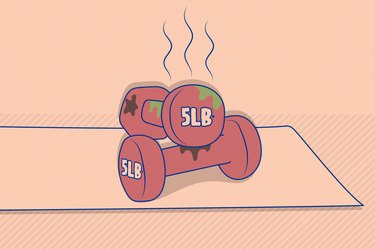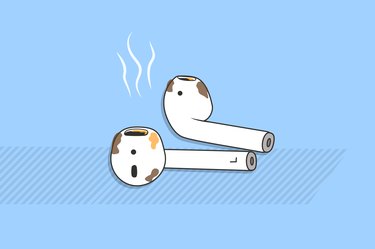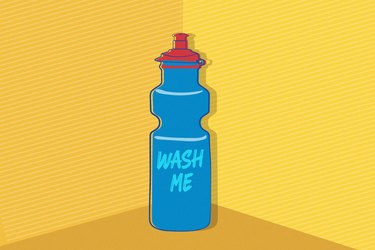
When you think about the amount of sweaty hands and bodies that encounter exercise equipment at your local gym each day, it's no surprise that your fitness center probably isn't the most sanitary setting.
Case in point: A 2021 study commissioned by the company Fit Rated, which reviews gym equipment, collected bacteria samples from 27 different pieces of equipment at three gyms. Here's what they found: Exercise bikes boast 39 times more bacteria than a cafeteria tray, while free weights have 362 times more bacteria than a toilet seat.
Video of the Day
It's safe to say that public places propagate more pathogens than a petri dish, which is why it's so important to wipe down shared equipment before and after use.
But if you exercise at home, and you're the only person who uses your workout equipment, you should be totally safe from these gym germs, right? Well, that depends on a few factors, including how often you clean your gear. Gulp.
If you took a swab of the surface of your yoga mat or dumbbell, you might be dumbfounded by the bounty of bugs (like bacteria, fungi and viruses) you'd find there.
"Our bodies are constantly shedding naturally present and generally harmless bacteria," says Kelly Reynolds, PhD, director of the Environment, Exposure Science and Risk Assessment Center at the University of Arizona. "Most of the time these organisms do not make us sick, but we can also carry harmful germs that are excreted through sweat, mucus, saliva and feces."
What's more, "harmful germs can be picked up on our hands or clothes from the contaminated surfaces [outside our homes] or the hands of others," she adds. And when these microbes multiply and make a home on your rarely rinsed gym equipment, they can cause a host of potential health problems.
Here, Reynolds explains what happens if you let your exercise gear get grimy, plus tips on how to clean your machines, mats and other gym equipment.
4 Reasons to Clean Your Workout Equipment Regularly
1. It Can Cause a Skin Infection
You can pick up a pesky skin infection from any public area (like a bathroom faucet or another surface that came in contact with an infected person) and bring it home where it can proliferate on your personal gym equipment. Exercise gear — which often becomes moist with sweat — is a hotbed for many meddling microbes.
Common germs that can be found on your dirty exercise equipment include, per Reynolds:
- Fungi (such as Trychophyton) that cause athlete's foot: These fungi flourish in humid conditions and create an itchy, scaly rash that can spread via skin-to-skin contact or contaminated surfaces (like your athletic apparatuses).
- Staph bacteria (and its antibiotic-resistant cousin MRSA): While this type of bacteria often resides on your skin without creating problems, it can lead to an infection if it enters an open wound or cut. Staph infections may result in red, swollen and painful pimples or boils or even produce pus or a crust, according to the National Library of Medicine. In more serious cases, they can also cause bone and heart infections, which may manifest as flu-like symptoms, such as fever and chills.
2. It Can Aggravate Acne
If nasty skin infections weren't bad enough, dirty gym equipment can also breed breakouts. "Bodily fluids, dirt, skin oils and associated bacteria [that accumulate on unclean equipment] can clog pores, irritate skin and worsen acne," Reynolds says.
Acne often occurs on your chest, upper back and shoulders, i.e., sections of your skin with the most oil glands, according to the Mayo Clinic. And these oilier areas are usually the parts that touch your workout bench or exercise mat.
3. It Can Make You Sick
Contagious viruses, like influenza, SARS-CoV-2 and RSV, can hitch a ride from soiled surfaces outside your home (like dirty doorknobs) onto your hands and then relocate to other objects (like your home athletic gear), Reynolds says.
Although these respiratory viruses are more likely to be transmissible via droplets when coughing or sneezing, these germs can still land on surfaces and cause infections, especially if someone in your home is sick with one of these viruses.
From there, some viruses can survive on surfaces for days (even weeks) and infect you through a mucus membrane like your eyes or nose, she says.
"Other germs can enter through the mouth and infect you through the gastrointestinal tract, causing the stomach flu and diarrhea," Reynolds says.
Take, for example, the bacteria E. coli. It can spread when you ingest germs via contact with a contaminated surface, food or water. These pathogens often inhabit the intestines of healthy individuals, and most strains are harmless. However, certain types can trigger severe stomach cramps, bloody diarrhea and vomiting, according to the Mayo Clinic.
For most folks, getting sick with E. coli (or the flu) is short-lived. While inconvenient, your symptoms will usually resolve within a week or so. But some people — including older adults and those with weakened immune systems — may have a higher risk for more serious complications.
4. It Can Negatively Affect How Your Equipment Works
Not only can an infrequent cleaning schedule hamper your health, but it can also harm your exercise equipment and shorten its lifespan. This can be especially disheartening if you spent a pretty penny to piece together your perfect home gym.
So how does all that dirt and grime gunk up your gear? For one, your equipment's exposure to persistent perspiration can produce problems.
"Sweat can have natural enzymes that may corrode, fade or, over time, degrade equipment surfaces," Reynolds says.
Even if you don't use a piece of equipment regularly, the layer of dust that accumulates can limit its effectiveness. "Dirt, dust and other particulate matter — including skin cells, hair and insect parts — can impact how your gym equipment works," Reynolds says.
Yep, these tiny particles can actually clog up moving machine parts like the wheels of an exercise bike or the belt of a treadmill.
How Often Should You Clean Your Workout Equipment?
"The best practice is to wipe down exercise equipment after each use to keep the germ count low and minimize surface degradation," Reynolds says.
For gear you use less often, a weekly dusting can help keep the dust particles from piling up.
To protect yourself from possible disease-causing pathogens and prolong the life of your personal gym, try these cleaning tips to ensure each piece of your equipment stays sanitary.
Yoga Mats
"Alcohol wipes are convenient and compatible with most surfaces," Reynolds says. "But scrubbing with soap and water first can help to loosen up debris so that the alcohol can penetrate any remaining germs more efficiently," she adds.
If your yoga mat is machine washable, cleaning is a cinch: Toss it in the wash (by itself) and follow the manufacturer's instructions.
Dumbbells, Kettlebells, Barbells and Workout Benches
"Disinfecting wipes or trigger sprays and a disposable cloth are great strategies for decontaminating dumbbells, kettlebells, barbells and workout benches," Reynolds says.
Resistance Bands
"Rubber resistance bands can be dipped in a diluted bleach solution or wiped with disinfecting wipes," Reynolds says.
Have a cloth band? No worries. "Cloth bands can be placed in a mesh laundry bag and thrown in with your regular wash load," Reynolds says. "Most germs are killed in the dryer cycle or with the use of bleach additives in the wash," she adds.
If the cloth material isn't bleach-compatible, you can eliminate this step.
Treadmills and Stationary Bikes
"In general, alcohol wipes are safe for most electronics" like treadmills and indoor bikes, Reynolds says. Still, it's always best to check the manufacturer's recommendations for compatible cleaners and sanitizers, she says.
So, How Bad Is It Really to Never Clean Your Workout Equipment?
Ick factor aside, rarely cleaning your exercise equipment likely won't harm you if you're in overall good health. But to avoid unwanted body acne or skin infections, sanitizing your stuff on a regular basis is a safe strategy.
The same goes for people with less robust immune systems. Since a germy home gym might make you more susceptible to becoming sick, disinfecting daily (or after each use) is the way to go.
At the very least, a weekly wipe-down or dusting session can help keep all your athletic gear functioning at its best.



